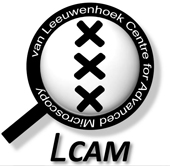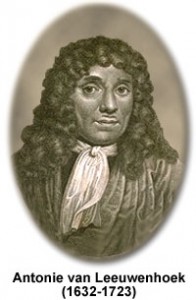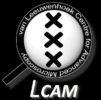LCAM
Van Leeuwenhoek Centre for Advanced Microscopy (LCAM)
The aim of the van Leeuwenhoek Centre for Advanced Microscopy (LCAM) is to boost life sciences research where light microscopy plays a central role. LCAM is a collaboration between Faculty of Science (LCAM-FNWI) of the University of Amsterdam, the Academic Medical Centre (LCAM-AMC) and the Dutch Cancer Institute (LCAM-NKI) in Amsterdam, The Netherlands
LCAM-FNWI is embedded within the section of Molecular Cytology of the Swammerdam Institute for Life Sciences (SILS). The staff of LCAM, headed by prof. dr T.W.J. Gadella, has the expertise, skills and experience to give professional support and coaching to researchers within and outside SILS to use advanced microscopy for their research. LCAM has a complete range of microscopes, image analysis and data storage equipment to facilitate scientific research. LCAM translates biological problems into microscopical solutions.
In addition to enabling life sciences research within the section of Molecular Cytology and scientific collaborations with other research groups, LCAM-FNWI works on the development of novel microscopy and analysis techniques that enable new biological research. New microscopic techniques are being developed in close collaboration with commercial companies. Currently most prominent developments are within the domain of Functional Imaging (FRET, FLIM, FC(C)S, ICS, PCH, FRAP) and dynamic multi-parameter imaging (spinning disk, (spectral) confocal and multi-channel widefield ratio imaging).
Antonie van Leeuwenhoek

LCAM is named after Antonie Philips van Leeuwenhoek (October 24, 1632 – August 26, 1723) who was a Dutch tradesman and scientist. He is commonly known as “the Father of Microbiology”, and considered to be the first microbiologist. He is best known for his work on the improvement of the microscope and for his contributions towards the establishment of microbiology.
Raised in Delft, Netherlands, Leeuwenhoek worked as a draper in his youth, and founded his own shop in 1654. He made a name for himself in municipal politics, and eventually developed an interest in lensmaking. Using his handcrafted microscopes, he was the first to observe and describe single-celled organisms, which he originally referred to as animalcules, and which are now referred to as microorganisms.
He was also the first to record microscopic observations of muscle fibers, bacteria, spermatozoa, and blood flow in capillaries (small blood vessels). Leeuwenhoek did not author any books; his discoveries came to light through correspondence with the Royal Society, which published his letters. For more info click here.
In 2023 it’s 300 years ago that he died at an age of 90 years after a life full of wonder, observations and discoveries using the microscope. Therefore some special events will be organised during the year as summarised at the webpage https://antonivanleeuwenhoekjaar.nl (in Dutch only).
LCAM is Eurobioimaging Flagship Node on Functional Imaging & High-Throughput Microscopy
Euro-BioImaging (EuBI) is an extensive research infrastructure that provides open access, services and training to a broad range of state-of-the-art biological![]() and medical imaging technologies. EuBI offers validated, high quality services to life scientists in Europe and beyond, in a coordinated and harmonized environment, hosted by top research institutes across Europe.
and medical imaging technologies. EuBI offers validated, high quality services to life scientists in Europe and beyond, in a coordinated and harmonized environment, hosted by top research institutes across Europe.
Recently 28 European microscopy centres were nominated as EBI Flagship nodes. The Euro-BioImaging consortium aims to build an infrastructure of wide-ranging, state-of-the-art imaging technologies. Thanks to its open access structure, it will provide life scientists in Europe and beyond with access to sophisticated microscopy facilities for biological, molecular and medical research. Also many Dutch microscopy centres are part of EuBI and with this European recognition the prominence of the Dutch research tradition in the field of microscopy has been confirmed. The Dutch centres are united in the NL BioImaging Advance Microscopy roadmap, coordinated by the University of Amsterdam.
According to Euro-BioImaging, LCAM is one of the leading microscopy centres in Europe. The centre has therefore been officially endorsed as EuBI Flagship node for Functional Imaging and High-Throughput Microscopy. With this quality seal, LCAM has attained the highest qualification in the development and application of advanced microscopy and imaging analysis and the provision of technology to users and is now ready to welcome external guests.
